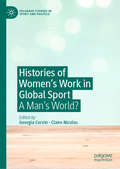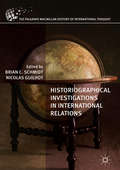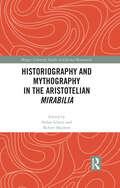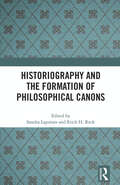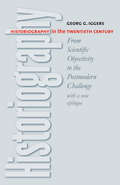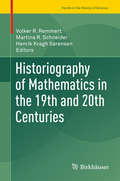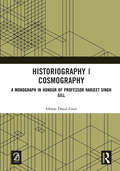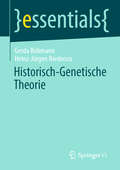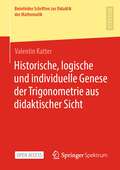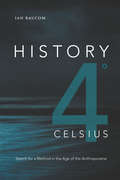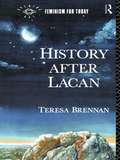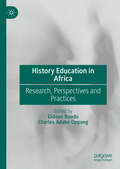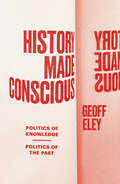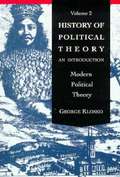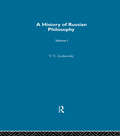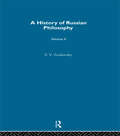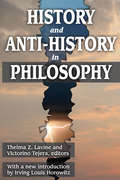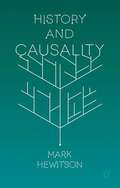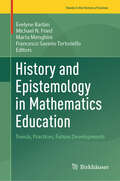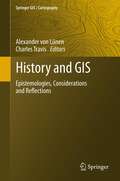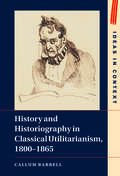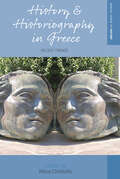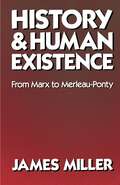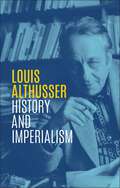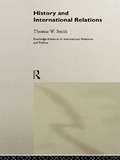- Table View
- List View
Histories of Women's Work in Global Sport: A Man’s World? (Palgrave Studies in Sport and Politics)
by Georgia Cervin Claire NicolasSport has never been a man’s world. As this volume shows, women have served key roles not only as athletes and spectators, but as administrators, workers, decision-makers, and leaders in sporting organizations around the world. Contributors excavate scarce archival material to uncover histories of women’s work in sport, from swimming teachers in nineteenth-century England to national sports administrators in twentieth-century Côte d’Ivoire, and many places in between. Their work has been varied, holding roles as teachers, wives, and secretaries in sporting contexts around the world, often with diplomatic functions—including at the 1968 and 1992 Olympic Games. Finally, this collection shows how gender initiatives have developed in sporting institutions in Europe and international sport federations today. With a foreword by Grégory Quin and afterword by Anaïs Bohuon, this is a pioneering study into gender and women’s work in global sport.
Historiographical Investigations in International Relations (The Palgrave Macmillan History of International Thought)
by Nicolas Guilhot Brian C. SchmidtThis book critically investigates the historiography of International Relations. For the past fifteen years, the field has witnessed the development of a strong interest in the history of the discipline. The chapters in this edited volume, written by some of the field’s preeminent disciplinary historians, all manifest the best of an innovative and exciting generation of scholarship on the history of the discipline of International Relations. One of the objectives of this volume is to take stock of the historical turn. Yet this volume is not simply a stock-taking exercise, as it also intends to identify the limitations and blind spots of the recent historiographical literature. The chapters consider a range of diverse thinkers and examine their impact on understanding various dimensions of the field’s history.
Historiography and Mythography in the Aristotelian Mirabilia (Rutgers University Studies in Classical Humanities)
by Robert Mayhew Stefan SchornThis is the first full-length volume in English that focuses on the historiographical section of the Mirabilia or De mirabilibus auscultationibus (On Marvelous Things Heard), attributed to Aristotle but not in fact by him. The central section of the Mirabilia, namely §§ 78–151, for the most part deals with historiographical material, with many of its entries having some relationship to ancient Greek historians of the 4th and 3rd centuries BC. The chapters in this volume discuss various aspects of this portion of the text, including textual issues involving toponyms; possible structural principles behind the organization of this section; the passages on Theopompus and Timaeus; mythography; the philosopher Heracleides of Pontos; Homeric exegesis; and the interrelationship between pseudo-Plutarch’s On Rivers, a section of the historian Stobaeus’ Geography, and the Mirabilia. Historiography and Mythography in the Aristotelian Mirabilia is an invaluable resource for scholars and students of this text, and of Greek philosophy, historiography, and literature more broadly.
Historiography and the Formation of Philosophical Canons
by Sandra Lapointe Erich H. ReckThis book presents a series of case studies and reflections on the historiographical assumptions, methods and approaches that shape the way in which philosophers construct their own past. The chapters in the volume advance discussion of the methods of historians of philosophy, while at the same time illustrating the various ways in which philosophical canons come into existence, debunking the myth of analytical philosophy’s ahistoricism and providing a deeper understanding of the roles historiographical devices play in philosophical thought. More importantly, the contributors attempt to understand history of philosophy in connection with other historical and historiographical approaches: contributors engage classical history of science, sociology of knowledge, history of psychology and historiography, in dialogue with historiographical practices in philosophy more narrowly construed. Additionally, select chapters adopt a more diverse perspective, by making place for non-Western approaches and for efforts to construe new philosophical narratives that do justice to the voice of women across the centuries. Historiography and the Formation of Philosophical Canons will be of interest to researchers and advanced students working in history of philosophy, meta-philosophy, philosophy of history, historiography, intellectual history and sociology of knowledge.
Historiography in the Twentieth Century: From Scientific Objectivity to the Postmodern Challenge
by Georg G. Iggers&“No one looking for a well-informed introduction to . . the key views of history adopted by professional historians . . could find a better one than this.&” ―Richard J. Evans, author of In Defence of History A broad perspective on historical thought and writing, with a new epilogue. In this book, now published in ten languages, a preeminent intellectual historian examines the profound changes in ideas about the nature of history and historiography. Georg G. Iggers traces the basic assumptions upon which historical research and writing have been based, and describes how the newly emerging social sciences transformed historiography following World War II. The discipline&’s greatest challenge may have come in the last two decades, when postmodern ideas forced a reevaluation of the relationship of historians to their subject and questioned the very possibility of objective history. Iggers sees the contemporary discipline as a hybrid, moving away from a classical, macrohistorical approach toward microhistory, cultural history, and the history of everyday life. The new epilogue, by the author, examines the movement away from postmodernism towards new social science approaches that give greater attention to cultural factors and to the problems of globalization. &“The book has all the virtues one associates with Georg Iggers—lucidity, detachment, balance, and the ability to reveal the relation between trends in historical writing and their political and cultural contexts.&” —Peter Burke, Cambridge University
Historiography of Mathematics in the 19th and 20th Centuries
by Volker R. Remmert Martina R. Schneider Henrik Kragh SørensenThis book addresses the historiography of mathematics as it was practiced during the 19th and 20th centuries by paying special attention to the cultural contexts in which the history of mathematics was written. In the 19th century, the history of mathematics was recorded by a diverse range of people trained in various fields and driven by different motivations and aims. These backgrounds often shaped not only their writing on the history of mathematics, but, in some instances, were also influential in their subsequent reception. During the period from roughly 1880-1940, mathematics modernized in important ways, with regard to its content, its conditions for cultivation, and its identity; and the writing of the history of mathematics played into the last part in particular. Parallel to the modernization of mathematics, the history of mathematics gradually evolved into a field of research with its own journals, societies and academic positions. Reflecting both a new professional identity and changes in its primary audience, various shifts of perspective in the way the history of mathematics was and is written can still be observed to this day. Initially concentrating on major internal, universal developments in certain sub-disciplines of mathematics, the field gradually gravitated towards a focus on contexts of knowledge production involving individuals, local practices, problems, communities, and networks. The goal of this book is to link these disciplinary and methodological changes in the history of mathematics to the broader cultural contexts of its practitioners, namely the historians of mathematics during the period in question.
Historiography | Cosmography: A Monograph in Honour of Professor Harjeet Singh Gill
by Ishwar Dayal GaurThis book attempts to study Panjab historiography from the viewpoint of cosmography, the concept derived from the cosmological paradigm which Professor Harjeet Singh Gill, an eminent semiotician, developed in his oeuvre. Since its introduction in the colonial Panjab, the discipline of historiography subdued the indigenous craft of history writing such as katha, qissa, janamsakhi, and jangnama wherein what Professor Gill has conceptualized as “the dialectic of representation and transcendence” remained ever active. This title has been co-published with Aakar Books. Print editions not for sale in South Asia (India, Sri Lanka, Nepal, Bangladesh, Pakistan and Bhutan)
Historisch-Genetische Theorie (essentials)
by Gerda Bohmann Heinz-Jürgen NiedenzuDie historisch-genetische Theorie verfolgt den Anspruch, die Genese der menschlichen kulturellen Lebensweise aus den naturgeschichtlichen Ausgangsbedingungen und die historisch differenten gesellschaftlichen Organisationsformen in ihrer Strukturfolge erklären zu können. Für die Theorie zentral ist das methodologische Primat ontogenetischer Entwicklungsprozesse. Die gesellschaftlichen Organisationsformen sind diesen konstruktiv verbunden, folgen in ihrer Entwicklung aber anderen Mechanismen. Es werden die Grundlagen der Theorie herausgearbeitet und auf deren zentrale Fragen und Themenbereiche eingegangen.
Historische, logische und individuelle Genese der Trigonometrie aus didaktischer Sicht (Bielefelder Schriften zur Didaktik der Mathematik #10)
by Valentin KatterIn diesem Open-Access-Buch führt Valentin Katter eine umfassende didaktisch orientierte Sachanalyse unter historisch-, logisch-, und individualgenetischen Gesichtspunkten durch, mit der es ihm möglich ist, systematisch sechs Grundvorstellungen zum Sinusbegriff zu identifizieren. Anhand detaillierter Videoanalysen zeigt der Autor anschließend, wie diese Grundvorstellungen genutzt werden können, um Denkprozesse von Lehramtsstudierenden in kooperativen Problemlösesituationen zu rekonstruieren. Diese Rekonstruktionen gewähren einen Einblick in das komplexe individuelle Netz von Vorstellungen und ermöglichen es, das Potential und mögliche Hindernisse, die in ihm stecken, auszuloten.
History 4° Celsius: Search for a Method in the Age of the Anthropocene (Theory in Forms)
by Ian BaucomIn History 4° Celsius Ian Baucom continues his inquiries into the place of the Black Atlantic in the making of the modern and postmodern world. Putting black studies into conversation with climate change, Baucom outlines how the ongoing concerns of critical race, diaspora, and postcolonial studies are crucial to understanding the Anthropocene. He draws on materialist and postmaterialist thought, Sartre, and the science of climate change to trace the ways in which evolving political, cultural, and natural history converge to shape a globally destructive force. Identifying the quest for limitless financial gain as the primary driving force behind both the slave trade and the continuing increase in global greenhouse gas emissions, Baucom demonstrates that climate change and the conditions of the Black Atlantic, colonialism, and the postcolony are fundamentally entwined. In so doing, he argues for the necessity of establishing a method of critical exchange between climate science, black studies, and the surrounding theoretical inquiries of humanism and posthumanism.
History After Lacan (Opening Out: Feminism for Today)
by Teresa BrennanLacan was not an ahistorical post-structuralist. Starting from this controversial premiss, Teresa Brennan tells the story of a social psychosis. She begins by recovering Lacan's neglected theory of history which argued that we are in the grip of a psychotic's era which began in the seventeenth century and climaxes in the present. By extending and elaborating Lacan's theory, Brennan develops a general theory of modernity. Contrary to postmodern assumptions, she argues, we need general historical explanation. An understanding of historical dynamics is essential if we are to make the connections between the outstanding facts of modernity - ethnocentrism, the relationship between the sexes and ecological catastrophe.
History Education in Africa: Research, Perspectives and Practices
by Gideon Boadu Charles Adabo OppongThis collection brings together African scholars in Africa and the diaspora to contribute to scholarly debates about critical issues in history teaching and learning in African schools. The book contributes to filling the gap in knowledge on African history, associated pedagogies and practices and its consequent effects on research and the declining popularity of history in African Schools. Specifically, the volume (a) examines current trends and practices in history education in African schools, (b) unveils the challenges and subtleties of teaching the next generation of teachers and students, and (c) examines classroom practices and opportunities for engagement with historical concepts in African schools. The book adds a much-needed African voice to the international history education literature and contribute to strengthening the place of history teaching and learning in Africa.
History Made Conscious: Politics of Knowledge, Politics of the Past
by Geoff EleyHow History has changed in the half-century since the 1960sDuring the last fifty years, the writing of history underwent two massive transformations. First, powered by Marxism and other materialist sociologies, the great social history wave instated the value of social explanation.Then, responding to new theoretical debates, the cultural turn upset many of those freshly earned certainties. Each challenge was profoundly informed by politics, from issues of class, gender, and race to those of identity, empire, and the postcolonial.The resulting controversies brought historians radically changed possibilities, expanding subject matters, unfamiliar approaches, greater openness to theory and other disciplines, a new place in the public culture. History Made Conscious offers snapshots of a discipline continuously rethinking its charge. How might we understand "the social" and "the cultural" together? How do we collaborate most fruitfully across disciplines? If we take theory seriously, how does that change what historians do? How should we think differently about politics?
History Of Political Theory An Introduction: Volume 2 Modern Political Theory
by George KloskoThe second volume of HISTORY OF POLITICAL THEORY provides an in-depth introduction to a select group of political thinkers. Professor Klosko weaves together excerpted materials with insightful commentary to create this thematically unified look at the central theoretical arguments of liberal political theory.
History Russian Philosophy V1 (Routledge Library Editions Ser.)
by V. V. ZenkovsyFirst published in 2003. Routledge is an imprint of Taylor & Francis, an informa company.
History Russian Philosophy V2 (Routledge Library Editions Ser.)
by V V ZenkovskyFirst published in 2003. Routledge is an imprint of Taylor & Francis, an informa company.
History and Anti-History in Philosophy (Nijhoff International Philosophy Ser. #34)
by Thelma Z. Lavine Victorino TejeraHistory and Anti-History in Philosophy demonstrates the viability of the idea of the unity of philosophic thinking and the reflective practice of the history of philosophy. It is a concise in-depth history of the deconstructive turn in philosophy, and of the styles of historical and interpretive contextualization afforded by diverse schools of thought. Thematic unity arises from the focus of contributors on the historical dimension of reflection in philosophy.History of philosophy and intellectual history come together when they are forced to practice foundational analysis, namely, when they feel the need to uncover "indubitables" of society. Indubitables are deeply held, usually unnoticed premises upon which a society or group acts, builds, and speaks. By foundational analysis, the editors do not mean the search for acceptable starting points of intellectual exploration, but the ongoing criticism of all such postulates of faith.For those interested in contextual analysis of Kant, Hegel, Marx, Dewey, Mannheim, Husserl, Dilthey, Heidegger, and Gadamer, this is an invaluable guide. The editors make plain their belief that not using history, as have past philosophies, is unphilosophic ideas in personal construction to a text that cannot supply reasons for being taken seriously in history. This volume illuminates the achievements of present-day social science insights. It merits a close reading by those for whom the history of ideas is a living entity.
History and Causality
by Mark HewitsonThis volume investigates the different attitudes of historians and other social scientists to questions of causality. It argues that historical theorists after the linguistic turn have paid surprisingly little attention to causes in spite of the centrality of causation in many contemporary works of history. Such neglect or criticism of causality in history on a theoretical level contrasts with persisting interest in causal analysis in sociology, political science, international relations and economics; historians have criticised these disciplines for searching in vain for quantitative proofs, probabilities and covering laws. Hewitson demonstrates, through a critical analysis of a series of overlapping linguistic, cultural and post-colonial 'turns', the extent to which intellectual, social, cultural and other historians have come to renounce the very idea of causality. It uncovers the nexus between the formulation of questions, selection of evidence, use of comparison and counterfactuals, and the refinement of theories, all of which are necessary for description and narrative.
History and Epistemology in Mathematics Education: Trends, Practices, Future Developments (Trends in the History of Science)
by Michael N. Fried Évelyne Barbin Marta Menghini Francesco Saverio TortorielloThis book explores the evolving relationship between the history and epistemology of mathematics and mathematics education over the past fifty years. Beginning with the international movement that emerged in the 1970s, it celebrates the enduring and expanding role of historical and epistemological perspectives in shaping teaching practices. Organized into seven thematic sections, the volume examines core issues such as how historical and epistemological insights enhance understanding of mathematical concepts, interdisciplinarity as a tool for teaching, and innovative approaches to teacher training. It also delves into the use of historical problems, ancient texts, and textbooks as teaching resources, alongside an analysis of the social and political dimensions of mathematics education. Special attention is given to the impact of the "modern mathematics" reform and its legacy in rekindling interest in the history of mathematics in education. Featuring contributions from diverse geographical and historical contexts, this book is an essential resource for teachers, researchers, and anyone passionate about the rich interplay of history, epistemology, and mathematics.
History and GIS: Epistemologies, Considerations and Reflections
by Alexander Von Lünen Charles TravisGeographical Information Systems (GIS) - either as "standard" GIS or custom made Historical GIS (HGIS) - have become quite popular in some historical sub-disciplines, such as Economic and Social History or Historical Geography. "Mainstream" history, however, seems to be rather unaffected by this trend. More generally speaking: Why is it that computer applications in general have failed to make much headway in history departments, despite the first steps being undertaken a good forty years ago? With the "spatial turn" in full swing in the humanities, and many historians dealing with spatial and geographical questions, one would think GIS would be welcomed with open arms. Yet there seems to be no general anticipation by historians of employing GIS as a research tool. As mentioned, HGIS are popular chiefly among Historical Geographers and Social and Economic Historians. The latter disciplines seem to be predestined to use such software through the widespread quantitative methodology these disciplines have employed traditionally. Other historical sub-disciplines, such as Ancient History, are also very open to this emerging technology since the scarcity of written sources in this field can be mitigated by inferences made from an HGIS that has archaeological data stored in it, for example. In most of Modern History, however, the use of GIS is rarely seen. The intellectual benefit that a GIS may bring about seems not be apparent to scholars from this sub-discipline (and others). This book wants to investigate and discuss this controversy. Why does the wider historian community not embrace GIS more readily? While one cannot deny that the methodologies linked with a GIS follow geographical paradigms rather than historical ones, the potential of GIS as a 'killer application' for digital historical scholarship should be obvious. This book brings together authors from Geography and History to discuss the value of GIS for historical research. The focus, however, will not be on the "how", but on the "why" of GIS in history.
History and Historiography in Classical Utilitarianism, 1800–1865 (Ideas in Context #136)
by Callum BarrellThis first comprehensive account of the utilitarians' historical thought intellectually resituates their conceptions of philosophy and politics, at a time when the past acquired new significances as both a means and object of study. Drawing on published and unpublished writings - and set against the intellectual backdrops of Scottish philosophical history, German and French historicism, romanticism, positivism, and the rise of social science and scientific history - Callum Barrell recovers the depth with which Jeremy Bentham, James Mill, George Grote, and John Stuart Mill thought about history as a site of philosophy and politics. He argues that the utilitarians, contrary to their reputations as ahistorical and even antihistorical thinkers, developed complex frameworks in which to learn from and negotiate the past, inviting us to rethink the foundations of their ideas, as well as their place in - and relationship to - nineteenth-century philosophy and political thought.
History and Historiography in Greece: Recent Trends (Making Sense of History)
by Nikos ChristofisAn updated guide to Greek historiography was long overdue. In this comprehensive and temporally wide-ranging reassessment, History and Historiography in Greece examines the evolution of Greek historical scholarship by reviewing the ideas, methods, and schools of history shaping the field. From how these developments correspond with international trends, to their rate of development alongside global shifts in scholarship, this volume identifies not only the ideological limitations shaping Greek academia, but also the innovations that are breaking new ground. In doing so, the contributors illuminate how those developments yield new lessons for existing conceptual frameworks within the fields of labor, gender, diaspora studies, and more.
History and Human Existence—From Marx to Merleau-Ponty
by James MillerFrom the Introduction:The present essay provides an introduction to the treatment of human existence and individuality in Marxist thought. The work will be primarily concerned with two related topics: the evaluation by Marxists of individual emancipation and their assessment of subjective factors in social theory. By taking up these taking up these topics within a systematic and historical framework, I hope to generate some fresh light on several familiar issues. First, I pursue a reading of Marx focused on his treatment of subjectivity, individuation, and related methodological and practical matters; second, I apply this interpretation to analyzing the dispute between Marxist orthodoxy and heterodoxy over such matters as class consciousness and the philosophy of materialism; finally, I employ this historical context to clarify the significance of "existential Marxism," Maurice Merleau-Ponty's and Jean-Paul Sartre's contribution to Marxist thought.
History and Imperialism: Writings, 1963-1986
by Louis AlthusserWritings on History brings together a selection of texts by Louis Althusser dating from 1963 to 1986, including essays, a lecture, notes to his collaborators, and the transcript of an informal 1963 discussion of literary history. The centrepiece of this collection is Althusser’s previously unpublished Book on Imperialism, a theorization of globalized capitalism that remained unfinished. All these writings are concerned with the place of history in Marxist theory and, in particular, on what Althusser considered to be the mortal danger of historicism haunting the revolutionary reading of the present. They testify to his continuing dialogue with the historiography of his day, several of whose representatives were engaged in discussion and debate with him. Deeply interested in history but intent on avoiding the kind of interpretation that would transform it into a deterministic force, Althusser never ceased to reflect on the equilibrium between the historical and the concept in Marxist historiography, an equilibrium that he sought to reinvent for his time. The traces of that undertaking, which continues to generate debate throughout the world today, are brought together in this volume.
History and International Relations: History's Revenge And Future Shock (Routledge Advances in International Relations and Global Politics #97)
by Thomas W. SmithThis book is a major contribution to the debate about philosophy and method in history and international relations. The author analyses IR scholarship from classical realism to quantitative and postmodern work.
